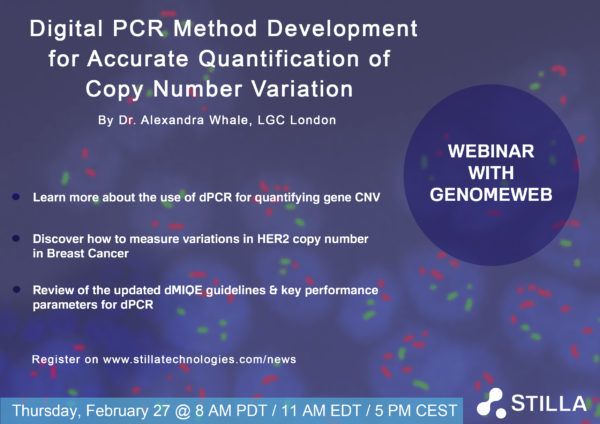Stilla’s webinar in collaboration with GenomeWeb & LGC London on Thursday 27th of February 2020
Digital PCR Method Development for Accurate Quantification of Copy Number Variationsby Alexandra Whale (LGC London)
Speakers’s Bio
Alexandra Whale is the Science Leader for Nucleic Acid Innovation within the Molecular and Cell Biology Team of the National Measurement Laboratory (NML) hosted at LGC. The NML is the designated institute for chemical and bioanalytical measurements in the UK. Since joining in 2009, her research has focused on the use of digital PCR in a wide range of applications that include quantification and detection of DNA associated with microorganisms and antimicrobial resistance, and detection of copy number variation and rare sequences in cancer. Recent areas of particular interest are the design of higher order multiplexing assays and how they can be applied to synthetic biology.
Abstract
Since the publication of the “The Digital MIQE Guidelines: Minimum Information for Publication of Quantitative Digital PCR Experiments” (dMIQE) in 2013, there has been a large expansion of the applications of dPCR such as single nucleotide variations (SNVs) and copy number variations (CNVs) measurements associated with disease diagnostics. At the same time, international measurement organisations, such as the National Measurement Laboratory (NML) at LGC, have been working towards the development of molecular methods that are SI traceable to support the translation of these applications into the clinic. Digital PCR has the potential to be a traceable method as the concentration of a target is calculated based on the proportion of target-positive partitions and the application of Poisson statistics.
This webinar will focus on the use of dPCR for quantifying gene CNVs frequently used in diagnosis and selection of targeted therapy. Using models, like the HER2 gene in breast cancer, we will investigate the ability of dPCR to measure small changes in the gene copy number with further work to develop methods to counteract the measurement bias that can be caused by linked target copies in the sample. The talk will also highlight key dPCR performance parameters considered in the updated version of the dMIQE guidelines thereby fostering dPCR best practice and the use of dPCR as a gold standard approach.

